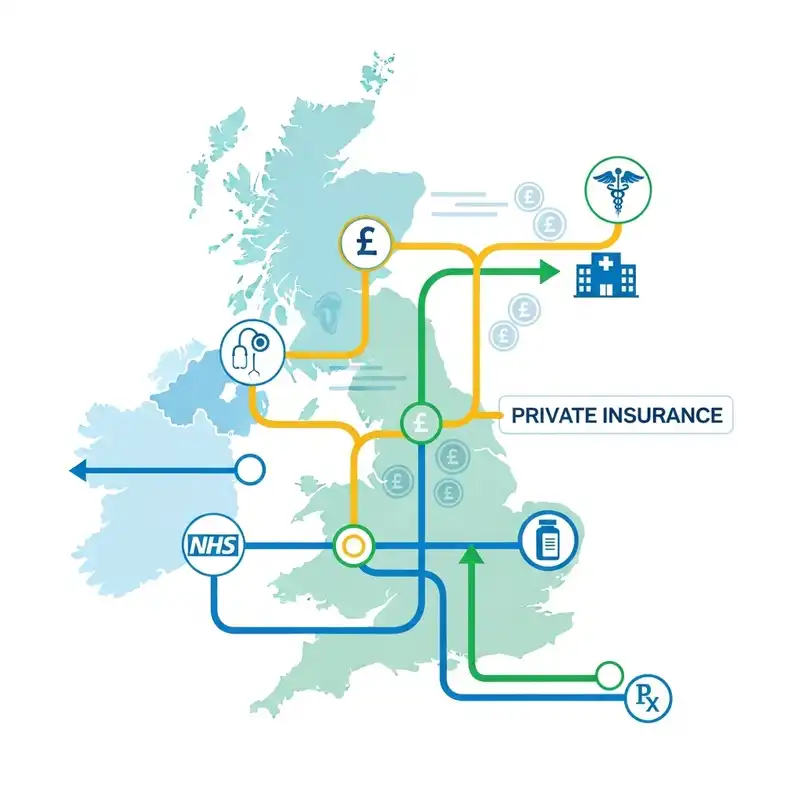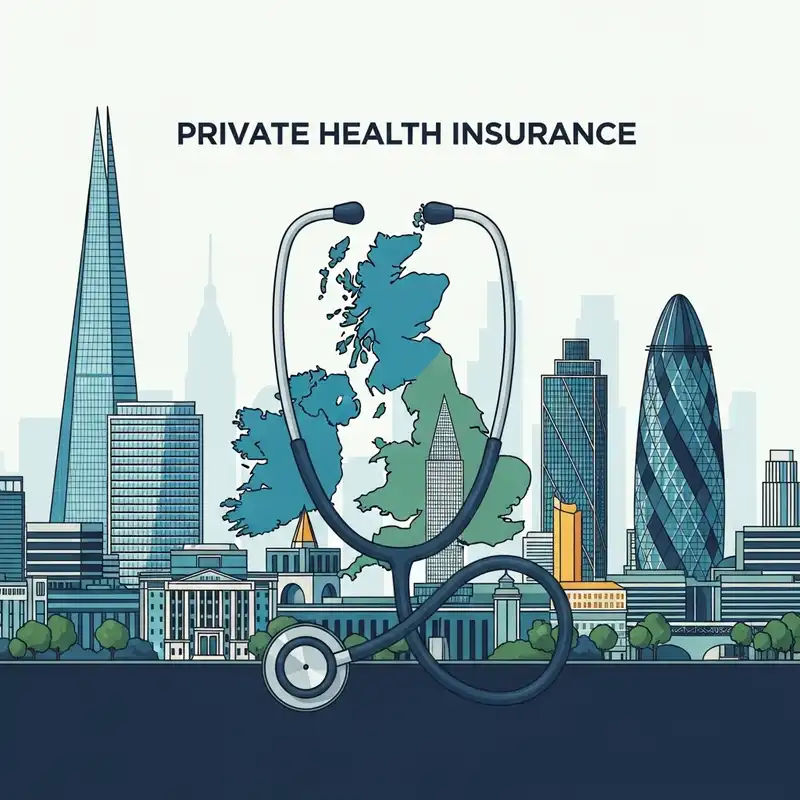TL;DR
As projections continue, about 1 in 2 people in the UK will be diagnosed with cancer in their lifetime, highlighting just one of the profound uncertainties that can derail your dreams. This isn't about fear; it's about empowerment. Private health insurance offers crucial peace of mind, providing swift access to specialist care and treatments that complement a strained NHS, but true resilience goes further.
Key takeaways
- The Cancer Projection: Cancer Research UK's long-term projection estimates that 1 in 2 people born after 1960 in the UK will be diagnosed with some form of cancer during their lifetime. This is a staggering figure that underscores the prevalence of serious illness.
- Long-Term Sickness: The Office for National Statistics (ONS) reported in early 2024 that the number of people economically inactive due to long-term sickness had reached a record high of 2.8 million people. This isn't just a statistic; it represents millions of lives, careers, and family finances profoundly impacted.
- Workplace Incidents: The Health and Safety Executive (HSE) figures for 2022/23 show that 1.8 million working people were suffering from a work-related illness, and 561,000 workers sustained a non-fatal injury. For a tradesperson, nurse, or anyone in a physically demanding role, an injury can mean an immediate stop to all earnings.
- Mental Health: According to the NHS, 1 in 4 adults experience a diagnosable mental health problem in any given year. Conditions like stress, anxiety, and depression are now leading causes of long-term work absence.
- What it is: A more specialised, often shorter-term form of income replacement, designed for accidents and sickness. It's particularly popular with tradespeople (electricians, plumbers, builders), nurses, and other manual workers.
The Ultimate Personal Growth Hack for 2025: Building Your Future-Proof Life Blueprint Amidst Mounting Health Realities
As projections continue, about 1 in 2 people in the UK will be diagnosed with cancer in their lifetime, highlighting just one of the profound uncertainties that can derail your dreams. This isn't about fear; it's about empowerment. Private health insurance offers crucial peace of mind, providing swift access to specialist care and treatments that complement a strained NHS, but true resilience goes further. Imagine a future where your passion for personal development and career acceleration isn't threatened by unexpected illness or injury – guaranteed by Income Protection or bespoke Personal Sick Pay for tradespeople, nurses, and electricians. Envision your loved ones’ financial security upheld through Family Income Benefit or Critical Illness Cover, even if the unimaginable happens. Consider the lasting legacy you can build with Life Protection and Gift Inter Vivos, ensuring your life's work truly endures. This is the strategic investment in your 'future self' that unlocks unparalleled freedom, allowing you to chase your goals without financial anxiety, truly mastering your journey.
The Uncomfortable Truth: Why Your Ambitions Need a Financial Safety Net
We are a nation driven by ambition. We meticulously plan our careers, invest in new skills, and dedicate ourselves to personal growth. We set goals, chase promotions, and dream of building a better future for ourselves and our families. Yet, we often overlook the one variable that can bring all this progress to a grinding halt: our health.
The reality of health in the 21st-century United Kingdom is a sobering one. Whilst we are living longer, we are not necessarily living healthier. Consider these statistics:
- The Cancer Projection: Cancer Research UK's long-term projection estimates that 1 in 2 people born after 1960 in the UK will be diagnosed with some form of cancer during their lifetime. This is a staggering figure that underscores the prevalence of serious illness.
- Long-Term Sickness: The Office for National Statistics (ONS) reported in early 2024 that the number of people economically inactive due to long-term sickness had reached a record high of 2.8 million people. This isn't just a statistic; it represents millions of lives, careers, and family finances profoundly impacted.
- Workplace Incidents: The Health and Safety Executive (HSE) figures for 2022/23 show that 1.8 million working people were suffering from a work-related illness, and 561,000 workers sustained a non-fatal injury. For a tradesperson, nurse, or anyone in a physically demanding role, an injury can mean an immediate stop to all earnings.
- Mental Health: According to the NHS, 1 in 4 adults experience a diagnosable mental health problem in any given year. Conditions like stress, anxiety, and depression are now leading causes of long-term work absence.
An unexpected illness or injury is never just a health event. It’s a financial event. It's a career event. It's a family event. The ripple effects can be devastating, washing away years of hard work and savings. Without a robust financial plan, the focus shifts from recovery and personal growth to pure survival.
| Potential Financial Impact of a 12-Month Sickness Absence | Without Protection | With Protection (e.g., Income Protection) |
|---|---|---|
| Primary Income | Drops to Statutory Sick Pay (£116.75/week for 28 weeks), then potentially to Universal Credit. | A significant portion of your regular monthly income (e.g., 50-70%) is paid out, tax-free. |
| Savings & Investments | Rapidly depleted to cover essential bills like mortgage, rent, and utilities. | Savings can be preserved for their intended purpose (retirement, education, home improvements). |
| Debt | May need to take on new debt (credit cards, loans) to cover shortfalls. | Existing debts can be serviced without stress. Mortgage payments are secure. |
| Lifestyle | Significant cutbacks required. Holidays, hobbies, and non-essentials are cancelled. | Lifestyle can be largely maintained, reducing stress on you and your family. |
| Career & Growth | Focus is on financial survival, not professional development or a smooth return to work. | You can focus 100% on your recovery, knowing your finances are secure. |
This isn't about planning to fail; it's about planning to succeed against the odds. It’s about building a financial fortress around your ambitions, so you can continue to strive and grow, no matter what life throws your way.
The Bedrock of Resilience: Your Personal Protection Portfolio
True financial resilience isn't built on a single product, but on a carefully constructed portfolio of protection policies tailored to your unique life. Think of it as a multi-layered defence system for your financial well-being. Each policy serves a distinct purpose, safeguarding a different aspect of your life and goals.
Let's break down the essential components of a robust protection blueprint.
1. Income Protection: Your Monthly Salary, Guaranteed
If you could only choose one policy, this would be it. Income Protection is the cornerstone of any financial plan for a working individual.
- What it is: A long-term insurance policy that pays you a regular, tax-free monthly income if you are unable to work due to any illness or injury.
- How it works: You choose a level of cover (typically 50-70% of your gross salary) and a "deferral period" (the time between you stopping work and the payments starting, e.g., 4, 13, 26, or 52 weeks). The policy then pays out every month until you can return to work, your policy term ends (usually at your chosen retirement age), or you pass away.
- Why it's crucial for personal growth: Income Protection gives you the ultimate freedom: the freedom to recover. It removes the terrifying pressure of having to rush back to work before you are ready. It ensures your mortgage, rent, bills, and food costs are covered, allowing you to focus on your health, rehabilitation, and eventual return to your career path, rather than watching your savings evaporate.
2. Personal Sick Pay: Short-Term Cover for Hands-On Professionals
For many, especially those in physically demanding jobs, a standard Income Protection policy might have a deferral period that is too long. That's where Personal Sick Pay comes in.
- What it is: A more specialised, often shorter-term form of income replacement, designed for accidents and sickness. It's particularly popular with tradespeople (electricians, plumbers, builders), nurses, and other manual workers.
- How it differs: These policies often have very short deferral periods (sometimes just one week) and may focus more on accidental injury. The payout term is typically shorter, usually for 1 or 2 years, making it a more affordable way to cover immediate income gaps.
- Why it matters: For a self-employed electrician who fractures a wrist, waiting 3 months for a payout is not an option. Personal Sick Pay provides a rapid financial lifeline, bridging the gap until they are back on their feet and earning again.
3. Critical Illness Cover: A Financial Lifeline Upon Diagnosis
Whilst Income Protection replaces your salary, Critical Illness Cover is designed to tackle the significant, one-off costs associated with a life-changing diagnosis.
- What it is: A policy that pays out a tax-free lump sum if you are diagnosed with one of a list of specified serious illnesses, such as cancer, heart attack, or stroke.
- How it helps: This lump sum is yours to use as you see fit. It can be used to:
- Clear or reduce your mortgage, removing your biggest monthly expense.
- Pay for private medical treatment or specialist consultations.
- Adapt your home (e.g., install a ramp or stairlift).
- Allow a partner to take time off work to care for you.
- Fund a period of recuperation without financial worry.
- The personal growth angle: A serious diagnosis can derail not just your life, but the lives of your loved ones. This lump sum provides financial breathing space, allowing the entire family to adjust and focus on what truly matters: your health and well-being.
4. Life Protection: Securing Your Legacy
This is the policy most people think of when they hear "insurance." Its purpose is simple but profound: to provide for your loved ones after you're gone.
- What it is: Life Protection (or Life Insurance) pays out a lump sum upon your death. The most common type is "Term Insurance," which covers you for a fixed period (e.g., until your children are adults or the mortgage is repaid).
- Why it’s essential: It ensures that your partner and children can remain in the family home, that debts are cleared, and that there is money available for future needs like university fees. It turns your income-earning potential into a tangible asset for your family, even in your absence.
5. Family Income Benefit: A Different Way to Protect
A smart alternative to a standard lump-sum life policy is Family Income Benefit.
- What it is: Instead of a single large payout, this policy pays your family a regular, tax-free monthly or annual income from the time of your death until the end of the policy term.
- The advantage: It can be easier for a grieving family to manage a regular income rather than a huge lump sum. It effectively replaces your lost salary, making budgeting simpler and providing long-term security. It's often more affordable than equivalent lump-sum cover, making it a great option for young families.
6. Gift Inter Vivos: Smart Inheritance Tax Planning
For those thinking about their legacy and estate planning, this is a crucial tool.
- What it is: When you gift a significant asset (like money or property), it may be subject to Inheritance Tax (IHT) if you pass away within seven years. A Gift Inter Vivos policy is a specific type of life insurance designed to pay out a lump sum to cover this potential tax bill.
- The benefit: It ensures that the full value of your gift goes to your intended recipient (e.g., your children or grandchildren) without being diminished by an unexpected IHT liability. It protects your legacy and ensures your generosity has the full intended effect.
Here’s a summary of how these protections form your financial shield:
| Protection Type | What It Does | Who It's For | How It Protects Your Growth |
|---|---|---|---|
| Income Protection | Provides a monthly income if you can't work due to illness/injury. | Every working person, especially the self-employed. | Allows you to focus on recovery without financial stress. |
| Critical Illness Cover | Pays a one-off lump sum on diagnosis of a serious illness. | Anyone with major debts like a mortgage or dependents. | Removes major financial burdens, giving you choices. |
| Life Protection | Pays a lump sum to your loved ones when you die. | Anyone with dependents or a partner who relies on their income. | Secures your family's future and protects your legacy. |
| Family Income Benefit | Provides a regular income for your family instead of a lump sum. | Young families who need to replace a lost salary for budgeting. | Provides stable, manageable financial support. |
| Personal Sick Pay | Provides a short-term income, often for accidental injury. | Tradespeople, nurses, and those in manual roles. | Bridges immediate income gaps after an accident. |
| Gift Inter Vivos | Covers the potential Inheritance Tax on a gift. | Individuals gifting large assets as part of estate planning. | Ensures your legacy is passed on intact. |
Navigating these options can seem complex, which is why working with an expert adviser is paramount. At WeCovr, we help you understand your specific needs and compare policies from across the entire UK market to build a portfolio that’s right for you, at the right price.
The Entrepreneur's Edge: Fortifying Your Business and Your Vision
For company directors, business owners, and the self-employed, the stakes are even higher. Your personal health is inextricably linked to the health of your business. A period of illness doesn't just impact your personal income; it can threaten the very survival of the enterprise you've worked so hard to build.
Fortunately, there are specialised protection solutions designed specifically for the business world. These are not just expenses; they are strategic investments in continuity and stability.
For the Self-Employed and Freelancers
If you are your own boss, you are also your own HR department, your own finance department, and your own safety net. There is no statutory sick pay beyond the bare minimum, no compassionate leave, and no one to pick up the slack.
- Income Protection is Non-Negotiable: For the self-employed, Income Protection isn't a 'nice to have'; it is an absolutely essential business continuity tool. It ensures your personal bills are paid, preventing you from having to dip into business cash flow or take on debt to survive, which could cripple your company.
For Company Directors and Business Owners
Beyond your personal cover, you need to protect the business entity itself.
-
Key Person Insurance: Who in your business is indispensable? It might be you, a co-founder with unique technical skills, or a top salesperson. Key Person Insurance is a policy taken out by the business on the life or health of a crucial employee. If that person passes away or is diagnosed with a critical illness, the policy pays a lump sum to the business. This money can be used to:
- Recruit and train a replacement.
- Cover lost profits during the disruption.
- Reassure lenders and investors.
- Clear business debts.
-
Executive Income Protection: This is a powerful and tax-efficient way for a business to provide top-tier protection for its directors and senior staff. The policy is owned and paid for by the company. If the director is unable to work, the benefit is paid to the company, which can then distribute it to the individual via PAYE. The premiums are typically treated as an allowable business expense, making it a highly efficient way to attract and retain key talent while ensuring their well-being.
-
Relevant Life Cover: This is a director's secret weapon for life insurance. It's a company-paid death-in-service benefit that provides a lump sum to the director's family. Crucially, the premiums are not treated as a P11D benefit-in-kind for the employee, and they are usually an allowable business expense for the company. It’s a far more tax-efficient way to arrange life cover than paying for a personal policy out of post-tax income.
| Business Protection | What It Is | Who Pays | Who Benefits | Primary Goal |
|---|---|---|---|---|
| Key Person Insurance | A policy on a key employee's life or health. | The Business | The Business | Protects business continuity and profitability. |
| Executive Income Protection | An income protection policy for a director/employee. | The Business | The Employee (via the business) | Provides income replacement in a tax-efficient way. |
| Relevant Life Cover | A life insurance policy for a director/employee. | The Business | The Employee's Family | Provides a tax-efficient death-in-service benefit. |
Building a business is the ultimate act of personal growth. Protecting it with the right insurance ensures your vision can withstand unforeseen challenges and continue to thrive.
Beyond the Policy: Cultivating a Holistic 'Future-Proof' Lifestyle
Whilst a robust insurance portfolio is your reactive shield, the proactive side of future-proofing your life is just as important. The ultimate goal is to live a long, healthy, and productive life, minimising the chances of needing to claim in the first place. This is where personal growth intersects directly with personal health.
A holistic 'Future-Proof' lifestyle is built on four key pillars.
1. Proactive Nutrition
What you eat is the fuel for your ambition. A balanced, nutrient-dense diet doesn't have to be complicated. Focus on whole foods: fruits, vegetables, lean proteins, and complex carbohydrates. Reducing processed foods, excessive sugar, and saturated fats can have a profound impact on your energy levels, cognitive function, and long-term health, reducing the risk of conditions like type 2 diabetes and heart disease.
At WeCovr, we believe in supporting our clients' holistic well-being. That's why, in addition to finding you the best protection policies, we also provide our customers with complimentary access to our AI-powered calorie and nutrition tracking app, CalorieHero. It's a simple way to take control of your diet and invest in your long-term health, showing our commitment goes beyond just the policy.
2. Consistent Physical Activity
The human body is designed to move. You don't need to be a marathon runner to reap the benefits. The NHS recommends at least 150 minutes of moderate-intensity activity a week. This could be a brisk 30-minute walk five days a week, a couple of bike rides, a yoga class, or playing a sport you enjoy. Regular exercise boosts your immune system, strengthens your heart, improves mental health, and is crucial for maintaining a healthy weight.
3. Prioritising Rest and Recovery
In our "always-on" culture, sleep is often the first thing to be sacrificed. This is a critical mistake. Sleep is when your body and mind repair, consolidate memories, and regulate hormones. Consistently getting 7-9 hours of quality sleep per night is one of the most powerful things you can do for your physical and mental resilience. Create a relaxing bedtime routine, put away screens an hour before bed, and make your bedroom a sanctuary for rest.
4. Nurturing Mental Resilience
Your mental health underpins everything. In an age of constant pressure, developing strategies to manage stress is vital. This could involve:
- Mindfulness or Meditation: Just 10 minutes a day can reduce anxiety and improve focus.
- Setting Boundaries: Learning to say 'no' and protecting your time and energy.
- Social Connection: Spending quality time with friends and family who support you.
- Pursuing Hobbies: Engaging in activities you love outside of work.
These four pillars work in synergy with your financial protection. By actively managing your health, you reduce your risks. And by having financial protection in place, you reduce the stress and anxiety that can negatively impact your health. It’s a virtuous cycle.
Building Your Blueprint: A Step-by-Step Guide to a Future-Proof Life
So, where do you begin? Building your personal and financial fortress is a clear, manageable process.
Step 1: Audit Your Current Reality Be honest with yourself. Get a clear picture of your financial life.
- Income: What is your monthly take-home pay?
- Outgoings: What are your essential monthly costs (mortgage/rent, utilities, food, transport)?
- Debts: How much do you owe on your mortgage, car loans, credit cards?
- Dependents: Who relies on you financially? (Spouse, children, ageing parents).
- Existing Cover: What protection do you already have? Check your employment contract for sick pay and death-in-service benefits. These are often less comprehensive than you might think.
Step 2: Define Your 'Non-Negotiables' What absolutely must be protected for you to have peace of mind?
- Is it ensuring the mortgage is paid so your family always has a home? (Life & Critical Illness Cover)
- Is it guaranteeing your income so you can pay the bills? (Income Protection)
- Is it protecting your business from the loss of a key person? (Key Person Insurance)
Step 3: Quantify Your Needs Put some numbers to your non-negotiables.
- Life Cover: How much is your mortgage? How much would your family need to live comfortably?
- Income Protection: How much income would you need to cover your essential outgoings? Remember, the benefit is tax-free, so you don't need to replace 100% of your gross salary.
- Term: How long do you need the cover for? Until the mortgage is paid? Until your youngest child is 21? Until your planned retirement age?
Step 4: Explore Your Options with Expert Guidance This is the most critical step. The UK protection market is vast and complex, with dozens of insurers offering products with subtle but important differences in their definitions and coverage. Going direct to an insurer means you only see one small part of the picture.
This is where an independent expert broker like WeCovr is invaluable. Our role is to:
- Listen: We take the time to understand your unique situation from Steps 1-3.
- Research: We use our expertise and technology to search the entire market, comparing policies from all the UK's leading insurers.
- Advise: We explain your options in plain English, highlighting the pros and cons of each policy so you can make an informed decision. We help you find the most comprehensive cover for your budget.
- Apply: We handle the application process for you, making it seamless and stress-free.
Step 5: Review and Adapt Regularly Your protection blueprint is not a "set and forget" document. Life changes, and your cover should change with it. Plan to review your portfolio every 3-5 years, or after any major life event:
- Getting married or entering a civil partnership.
- Buying a new home or increasing your mortgage.
- Having children.
- Changing jobs or getting a significant pay rise.
- Starting a business.
A regular review ensures your protection remains fit for purpose, safeguarding your ever-evolving life and ambitions.
Conclusion: The Ultimate Investment is in Your Uninterrupted Future
Personal growth is a journey of continuous improvement, learning, and striving. But the path is not always smooth. Unexpected health challenges are a fact of life, and they represent the single biggest threat to our carefully laid plans.
To truly future-proof your personal growth in 2025 and beyond is to adopt a dual strategy. On one hand, you must proactively invest in your health, skills, and well-being. On the other, you must build an unbreachable financial fortress around those ambitions with a tailored protection portfolio.
This is not about living in fear. It is the exact opposite. It is about empowerment. It is about removing the "what if" anxiety that holds so many of us back. It’s about giving yourself the freedom to take calculated risks, to chase audacious goals, and to build the life you dream of, safe in the knowledge that you have a safety net that will catch you.
The ultimate personal growth hack isn't a new productivity app or a self-help book. It's the profound peace of mind that comes from knowing your future is protected, no matter what. It’s the strategic investment in your 'future self' that unlocks the freedom to master your journey, completely and without reservation.
Isn't my employer's sick pay enough?
Is protection insurance expensive?
Do I need a medical exam to get cover?
Can I get cover if I have a pre-existing medical condition?
What's the main difference between Income Protection and Critical Illness Cover?
Why should I use a broker like WeCovr instead of going direct to an insurer?
Sources
- Office for National Statistics (ONS): Mortality and population data.
- Association of British Insurers (ABI): Life and protection market publications.
- MoneyHelper (MaPS): Consumer guidance on life insurance.
- NHS: Health information and screening guidance.

































